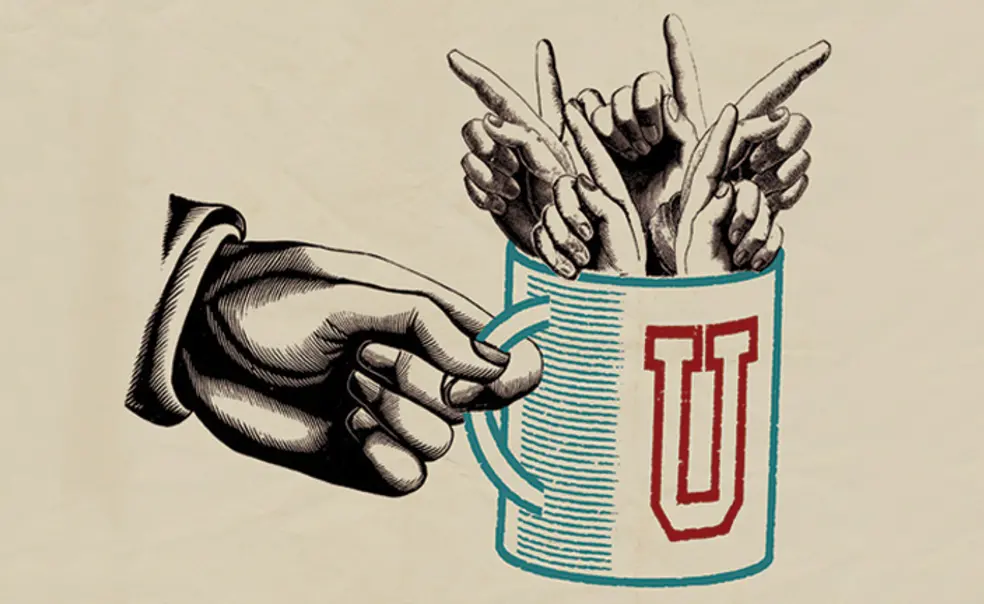Signers Say ‘Princeton Principles’ Up the Ante on Campus Free Speech
The James Madison Program’s principles say government intervention should be considered as ‘a last resort’
Fifteen academics convened by Princeton’s James Madison Program in American Ideals and Institutions are going beyond the well-known “Chicago Principles” in protecting free speech on college campuses by creating their own “Princeton Principles.”
Among other things, the document suggests trustees, alumni, students, and perhaps even government officials may need to step in and help colleges that are “failing to maintain cultures of free and vigorous inquiry.”
Robert P. George, a professor of politics at Princeton and director of the Madison Program, convened a group of academics at Princeton from both inside and outside the University to discuss free speech issues, which led to the creation of the Princeton Principles for a Campus Culture of Free Inquiry. Five of the original 15 signers are affiliated with Princeton; nearly three dozen scholars have endorsed the principles since they were published.
The seven-page document is available on the Madison Program’s website.
University spokesman Michael Hotchkiss told PAW by email that “the ‘Princeton Principles’ are not endorsed or authored by Princeton University,” and cited Princeton’s Statement on Freedom of Expression, which states in part that the University “is committed to free and open inquiry in all matters,” and that “except insofar as limitations on that freedom are necessary to the functioning of the University, Princeton University fully respects and supports the freedom of all members of the University community ‘to discuss any problem that presents itself.’”
The Madison Program’s principles go beyond the Chicago Principles of Free Expression — a 2014 University of Chicago commitment to free speech that has been adopted by nearly 100 colleges and universities, including Princeton — by stating that college faculty and administrators have a duty to protect free speech and should aim to hire and promote individuals with diverse viewpoints. Exceptions should be made only for “genuine threats, deliberate incitement to imminent violence, constitutionally defined obscenity, copyright violations, bribery, plagiarism, fraud, libel and slander, and violations of privacy or confidentiality.”
The Madison Program’s principles further state “other agents including regents, trustees, students, and alumni groups in the wider campus network may and indeed should become involved” if faculty are failing in these duties, and government intervention should also be considered as “a last resort.”
John K. Wilson, co-editor of AcademeBlog.org, wrote that the principles’ “failure to reject external political intrusions is a threat to free inquiry rather than a path toward it.”
“At a time when legislative intrusions pose an extraordinary threat to academic freedom, the Princeton Principles offer little resistance and tepid applause for repression,” Wilson wrote.
George told PAW by email that “reasonable people of goodwill disagree about lots of very important things,” but the signers of the Madison Program’s principles are “glad our critics have the right to criticize us … . We are first in line to defend their right to free speech.”
In September, Rep. Josh Gottheimer, a Democrat from New Jersey, joined the ongoing debate about whether a book that some claim is antisemitic should be included in a fall course at Princeton. Gottheimer wrote an open letter to President Christopher Eisgruber ’83 expressing dismay and stating that “the University is not only reminded, but obligated, to safeguard its students.”
In his response, Eisgruber wrote that while both free speech and equality are fundamental to a great university, “we can achieve our mission … only if people of all backgrounds feel welcome, respected, and free to express their opinions,” but that will never extend to “censoring speech, syllabi, or courses.”
Keith Whittington, a professor of politics at Princeton and a signer of the principles, said he was initially hesitant to endorse the document but was convinced after he realized it doesn’t differ dramatically from those principles already at play in academic freedom debates, such as the Chicago Principles. Whittington finds the Princeton Principles to be more comprehensive and specific.
He said he hopes the new principles serve as a wake-up call to those faculty and administrators who want to carve out exceptions to academic freedom protections.
Princetonians for Free Speech was not involved in drafting the principles but supports them. Edward L. Yingling ’70, co-founder of the group, said he and co-founder Stuart Taylor Jr. ’70 started Princetonians for Free Speech after “feeling that a lot of universities had lost their way.”
“Their purpose was based on free speech and academic freedom and open discourse. You really can’t advance knowledge if you don’t have that,” Yingling said, because otherwise, “you’re just an indoctrination camp.”
A recent survey of more than 1,000 American adults conducted by Langer Research Associates and published by The Chronicle of Higher Education showed that 68% feel college professors should have “a great deal or good amount of influence” on college teachings, followed by students and college administrators, which earned 64% and 61%, respectively. About 57% feel business and industry leaders should wield the same influence, and state and federal government earned 37% and 32%, respectively.
The data showed a partisan divide in some categories, but both Republicans and Democrats showed skepticism of government-shaped teaching.












No responses yet